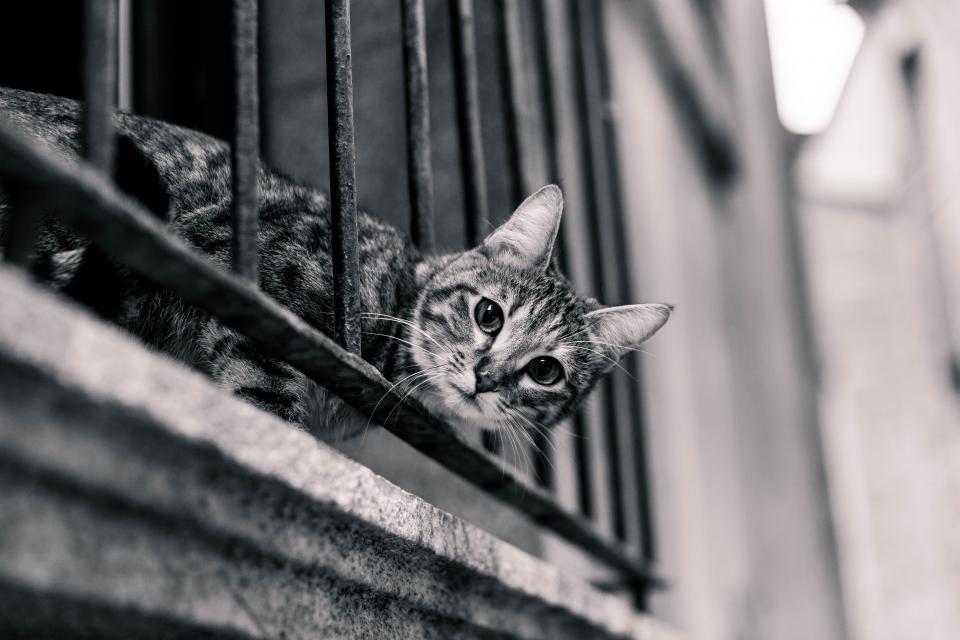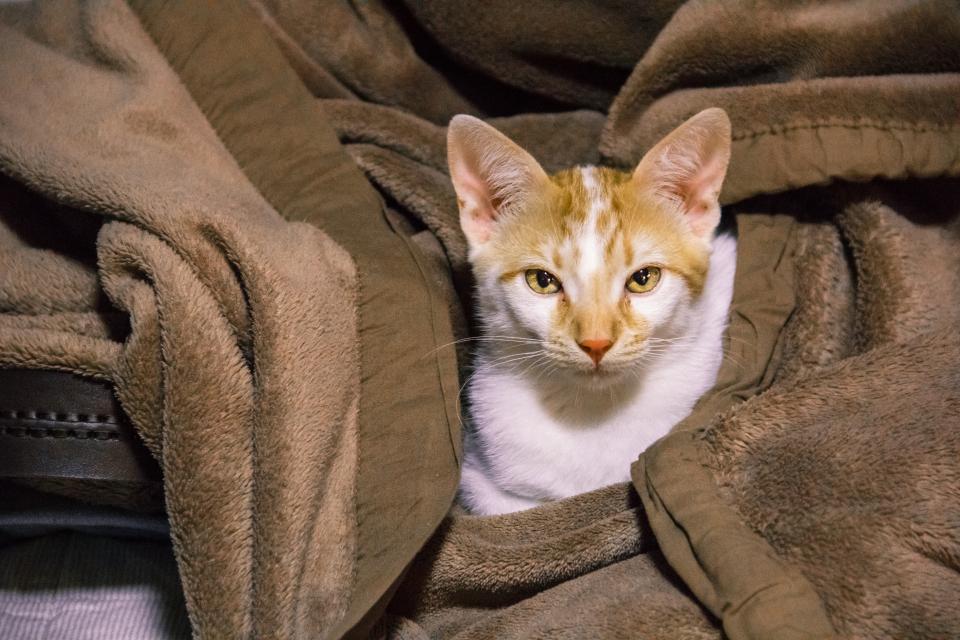This article examines the relationship between domestic cats and rabbits, addressing the question of whether cats prey on rabbits and the consequences of this behaviour. We delve into the reasons behind this feline instinct, the potential risks involved for both cats and rabbit populations, and offer practical strategies to prevent your cat from hunting rabbits. From understanding the evolutionary roots of feline predation to exploring responsible cat ownership, this comprehensive guide provides valuable information for cat owners concerned about the impact of their feline companions on local ecosystems.
Part 1: Uncovering the Feline Instinct to Hunt

1.1. Cats: Obligate Carnivores, Built for Hunting:
- Domestic cats, descendants of the African wildcat, are obligate carnivores, meaning their bodies are designed to thrive solely on a meat-based diet. Their digestive systems lack the necessary enzymes to efficiently break down plant matter.
- This dietary requirement fuels their natural instinct to hunt and capture prey, a behaviour deeply ingrained in their evolutionary history.
- Their sharp teeth and claws, powerful muscles, and keen senses are all adaptations for hunting and killing small animals.
1.2. The Primal Drive to Hunt:
- While domestic cats have access to readily available food, their primal hunting drive remains strong, even if they are well-fed. This instinct is not just about sustenance; it's a fundamental part of their behaviour, a way to satisfy their physical and mental needs.
- The act of hunting provides cats with mental stimulation, physical exercise, and a sense of accomplishment. It’s a way for them to express their natural instincts and maintain their physical and mental well-being.
- This drive can be triggered by the movement of small animals, the scent of prey, or even the sounds of birds or other creatures.
1.3. Why Rabbits Appeal to Cats:
- Rabbits, with their relatively small size, are easy prey for agile cats, especially for breeds like the Siamese, Abyssinian, and Bengal. Their size and movement patterns make them enticing targets for a cat's hunting instincts.
- The presence of rabbits in a cat’s territory can amplify their hunting drive, making them particularly susceptible to pursuing and capturing these small mammals.
- Rabbits' hopping movements, characteristic sounds, and scent trails can trigger a cat’s hunting response, making them particularly attractive prey.
Part 2: The Consequences of Cats Eating Rabbits

2.1. Impact on Local Rabbit Populations:
- Domestic cats can significantly impact local rabbit populations, especially in areas where rabbits are already facing challenges such as habitat loss or disease. Even well-fed cats can be efficient hunters, leading to a decline in rabbit numbers.
- This decline can disrupt the balance of the ecosystem. Rabbits are important prey for predators like foxes and owls, and their absence can have cascading effects on other species in the food chain.
- The impact of cats on rabbit populations is particularly pronounced in areas with high cat densities, such as urban areas or suburbs.
2.2. Potential Disease Transmission:
- Although relatively rare, cats can contract diseases from rabbits, such as toxoplasmosis. This parasitic disease can be harmful to humans, particularly pregnant women and individuals with compromised immune systems.
- It's crucial to practice proper hygiene to prevent disease transmission. Wash your hands thoroughly after handling cats or their prey, and avoid contact with cat faeces.
- Keeping cats indoors or supervised outdoors reduces the risk of disease transmission from rabbits to both cats and humans.
2.3. Risks to Your Cat’s Health and Safety:
- Rabbits can defend themselves, and bites from rabbits can be painful and potentially dangerous for cats. They can inflict wounds with their sharp teeth and powerful hind legs, leading to infections or injuries.
- Some rabbits carry parasites that can harm cats, such as intestinal worms or fleas. These parasites can cause discomfort, illness, and even death if left untreated.
- If your cat consumes a rabbit that has been poisoned or has ingested harmful substances, it can become seriously ill. It's important to keep cats away from areas where pesticides or other toxins are used.
Part 3: Preventing Your Cat from Hunting Rabbits: Practical Strategies for Responsible Cat Ownership
3.1. The Indoor Lifestyle: A Safe and Secure Option:
- Keeping your cat indoors is the most effective way to prevent it from hunting rabbits and ensure its safety. This provides a controlled environment where they are protected from predators, traffic, and other dangers.
- Indoor cats can still enjoy a fulfilling life with enrichment activities, regular playtime, and interaction with their human companions. Provide them with climbing structures, toys, and opportunities for mental stimulation.
- Indoor cats are less likely to contract diseases from rabbits and other wildlife, protecting both themselves and their owners.
3.2. Securing Outdoor Spaces for Safe Exploration:
- If you choose to let your cat outdoors, it's crucial to create a secure environment. High fences with mesh netting to prevent escape are essential. Install cat-proof gates and doors to prevent them from venturing into areas where rabbits may be present.
- Motion-activated sprinklers can be used to deter cats from venturing into specific areas. The water spray can act as a surprise and discourage them from exploring those zones.
- Supervise your cat when it's outdoors, especially during times when rabbits are most active. This allows you to intervene if necessary and prevent potential harm to both your cat and local rabbits.
3.3. Reducing Prey Drive: Satisfying Natural Instincts Through Enrichment:
- Engage your cat in interactive playtime sessions with toys that mimic prey movement. This can help channel their hunting instincts in a safe and controlled manner.
- Provide puzzle feeders that require your cat to work for its food, providing mental stimulation and satisfying its natural foraging instincts. These feeders can come in various forms, from food-dispensing balls to treat-filled boxes.
- Offer a high-quality diet that meets your cat's nutritional needs. This can reduce their desire to hunt by providing them with the necessary nutrients and energy from their food.
3.4. Training and Socialisation: Shaping Feline Behaviour:
- While training a cat to avoid rabbits is challenging, it’s possible with consistent effort and positive reinforcement. Reward your cat for staying away from rabbits with treats, praise, and petting.
- Socialisation from a young age can help cats learn to accept rabbits as non-prey. This involves gradual exposure to rabbits in a controlled setting, allowing them to become accustomed to their presence.
- Consult a professional cat trainer or behaviourist if you are struggling to train your cat. They can provide tailored advice and techniques for managing your cat's hunting behaviour.
Part 4: What to Do if Your Cat Catches a Rabbit
4.1. Assessing the Situation: A Calm and Careful Approach:
- If you witness your cat catching a rabbit, calmly assess the situation. Is the rabbit injured or dead? Is your cat showing signs of distress? Prioritise the safety of both the rabbit and your cat.
- If the rabbit is alive and unharmed, gently separate it from your cat. Use a broom or a long stick to create distance between them and prevent further interaction.
- If the rabbit is injured or dead, it's best to remove it from the area to prevent further harm or disease transmission. Wear gloves when handling a dead rabbit and wash your hands thoroughly afterwards.
4.2. Removal and Assistance: Seeking Help for Injured Rabbits:
- If you cannot safely remove the rabbit yourself, contact a local wildlife rescue organisation. They have the experience and resources to handle injured or distressed rabbits.
- When contacting a rescue organisation, provide details about the rabbit's condition, location, and any potential threats in the area. They will advise you on the best course of action.
- Remember that wildlife rescue organisations often rely on volunteers and donations, so consider offering your support to help them continue their important work.
4.3. Monitoring Your Cat’s Health and Behaviour:
- After a hunting encounter, monitor your cat closely for any signs of illness or injury. Watch for changes in behaviour, appetite, or energy levels.
- Consult a veterinarian if you notice any unusual behaviour, such as lethargy, vomiting, diarrhoea, or changes in litter box habits. They can assess your cat's health and provide appropriate treatment if necessary.
- Ensure your cat has access to fresh water and a balanced diet. This helps maintain their overall health and well-being, making them less likely to engage in risky behaviours like hunting.
Part 5: Addressing Common Questions
5.1. Are All Cats Hunters?
While most cats possess the instinct to hunt, not all cats will actively pursue rabbits. Some cats may be less interested in hunting due to temperament or lack of opportunity, while others may be more focused on other types of prey like birds or rodents.
5.2. Is It Safe for Cats to Eat Rabbits?
It's not generally recommended for cats to eat rabbits. Rabbits can carry parasites and diseases that can harm cats, such as intestinal worms, fleas, and toxoplasmosis. Additionally, rabbits may have been exposed to toxins or poisons, which could be dangerous for cats.
5.3. Can I Train My Cat to Avoid Rabbits?
While training a cat to avoid rabbits can be challenging, it's possible with consistent effort and positive reinforcement. Reward your cat for staying away from rabbits with treats, praise, and petting.
5.4. What Measures Can I Take to Protect Rabbits from My Cat?
The most effective way to protect rabbits from your cat is to keep your cat indoors or create a secure outdoor space with high fencing and netting. This provides a barrier that prevents your cat from accessing areas where rabbits are present.
5.5. What Should I Do if My Cat Brings a Rabbit Home?
If your cat brings a rabbit home, it's essential to remove the rabbit from the area immediately to prevent any harm or disease transmission. Gently separate your cat from the rabbit and carefully remove it from the area.
5.6. How Can I Discourage My Cat from Hunting Rabbits?
Engaging your cat in interactive playtime, providing puzzle feeders and other enrichment items, and feeding a high-quality diet can help to reduce your cat's desire to hunt. By fulfilling their physical and mental needs, you can discourage them from seeking out alternative outlets for their natural instincts.
5.7. What Should I Do if I Find a Dead Rabbit in My Garden?
If you find a dead rabbit in your garden, it's best to dispose of it safely to prevent disease transmission. You can contact your local council or a wildlife rescue organisation for guidance on safe disposal methods. They may have guidelines for burying or removing the rabbit to prevent potential health risks.
Everyone is watching
-

Do Rabbits Lay Eggs? (The Surprising Truth)
OTHER TYPES OF PETSThis article will unravel the common misconception that rabbits lay eggs, exploring the fascinating world of r...
-

Can Rabbits Eat Grapes? A Guide to Safe Rabbit Treats
OTHER TYPES OF PETSThis comprehensive guide will explore the safety and suitability of grapes for rabbits, providing detailed inf...
-

What's a Group of Rabbits Called? (A Comprehensive Guide)
OTHER TYPES OF PETSThis article delves into the fascinating world of rabbits, exploring the various terms used to describe a grou...
-

Predators That Hunt Rabbits: A Guide to Natural Enemies
OTHER TYPES OF PETSI've always been fascinated by the circle of life, that delicate dance between predator and prey. Growing up ...
-

Are Rabbits Nocturnal Animals?
OTHER TYPES OF PETSThe question of whether rabbits are nocturnal animals is a fascinating one, with a surprisingly complex answer...
